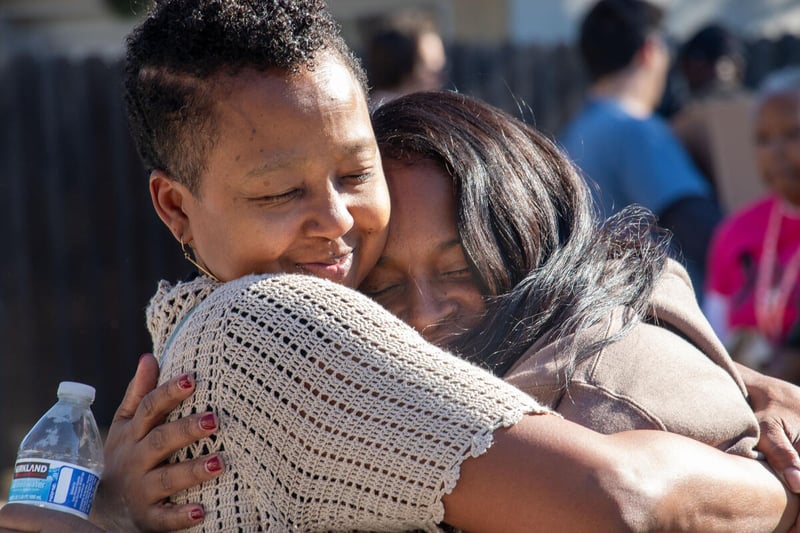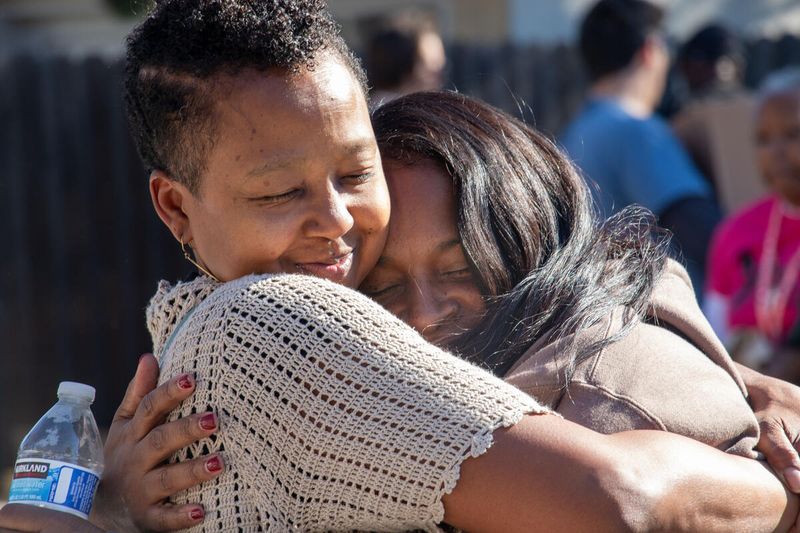
Hugs abounded at Victory Bible Church in Pasadena, California, as people arrived for church and an essential supplies distribution. World Vision donated supplies to aid the church’s distribution efforts. (© 2025 Genesis Photo Agency/photo by Andrew Silk)
Hugs abounded at Victory Bible Church in Pasadena, California, as people arrived for church and an essential supplies distribution. World Vision donated supplies to aid the church’s distribution efforts. (© 2025 Genesis Photo Agency/photo by Andrew Silk)
As the people of Los Angeles woke up on January 7, 2025, they were greeted by beautiful blue skies and strong Santa Ana winds. But in the background, vying for attention on the otherwise normal day, were high fire warnings.
Residents were used to both these fire warnings and seasonal high winds. And in recent years, the area had experienced some smaller urban fires, but there hadn’t been massive fires in Los Angeles County since the 1960s — pre-dating many of the people who now live there.
But January’s particular conditions were extra ripe for a massive disaster. The extremely dry ground was filled with plenty of new-growth vegetation that had sprung up after massive rains the past couple years. And these particular Santa Ana winds were much stronger than usual, with 100-mph gusts.
Around 10:30 that morning, smoke broke out near a popular hiking trail in the hills above the Pacific Palisades neighborhood. Soon the blue skies turned black as those winds carried a rapidly growing fire and swept through the Pacific Palisades neighborhood, quickly displacing thousands of people. The fire devoured homes, businesses, schools, and places of worship as it rushed toward the ocean.
Eight hours later, in the early evening, another fire erupted in the Eaton Canyon and began racing down the mountainside toward Altadena and Pasadena. Thousands more people fled their homes as embers scattered erratically in the turbulent winds. And around 10:30 that night, yet another fire broke out in Sylmar, prompting more evacuations.
Los Angeles was burning and people were reeling.
Over three days, a total of seven fires across the region would burn about 40,000 acres, placing 180,000 people under evacuation orders, killing 29, and destroying more than 16,000 structures.
Within hours of the first fires starting, World Vision was already responding to the crisis. That first day, World Vision’s U.S. Programs teams in Dallas and Chicago loaded two semitrucks full of essential supplies and dispatched them to LA.
Within two days, those supplies were already being distributed through local church and community partners. Within the first two weeks of the fires, World Vision delivered 26 truckloads of supplies to help serve 21,800 people.
Here are just a few of their stories.
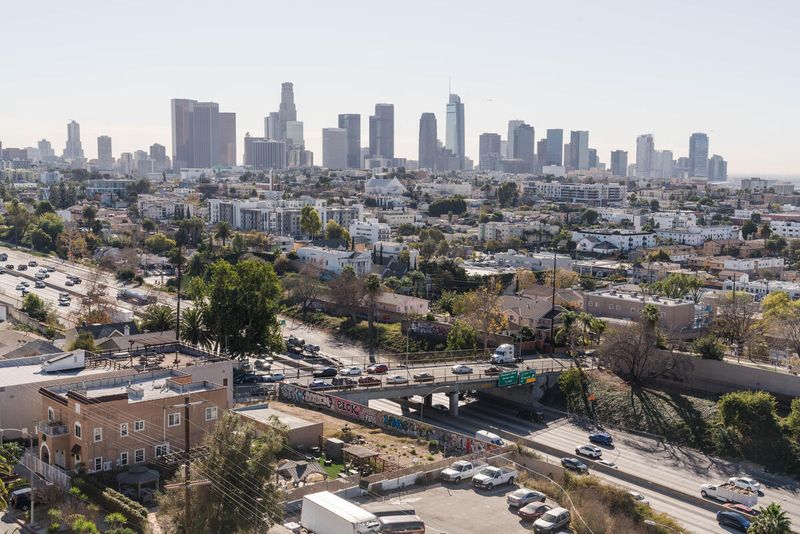
Los Angeles was under extreme fire danger on January 7, 2025. (© 2025 World Vision/photo by Amy Van Drunen)
Los Angeles was under extreme fire danger on January 7, 2025. (© 2025 World Vision/photo by Amy Van Drunen)
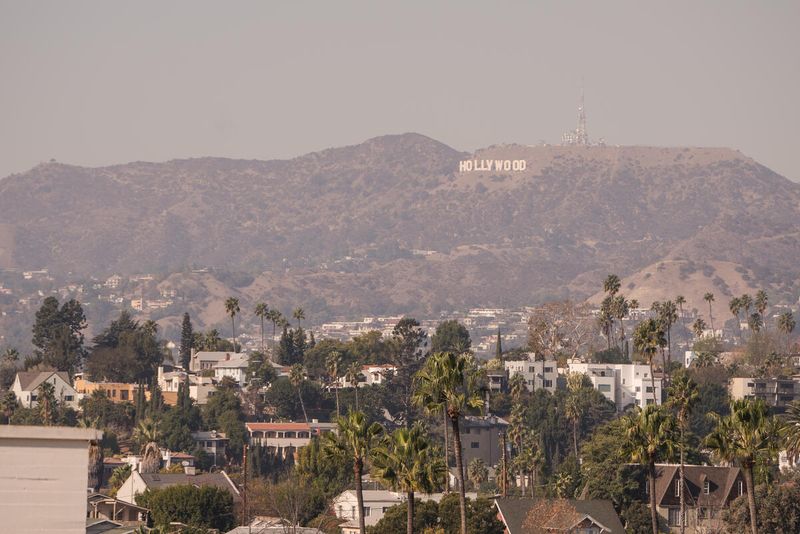
Many people enjoy walking and running in the mountains surrounding Los Angeles. The Palisades fire started on a popular hiking trail.
Many people enjoy walking and running in the mountains surrounding Los Angeles. The Palisades fire started on a popular hiking trail.
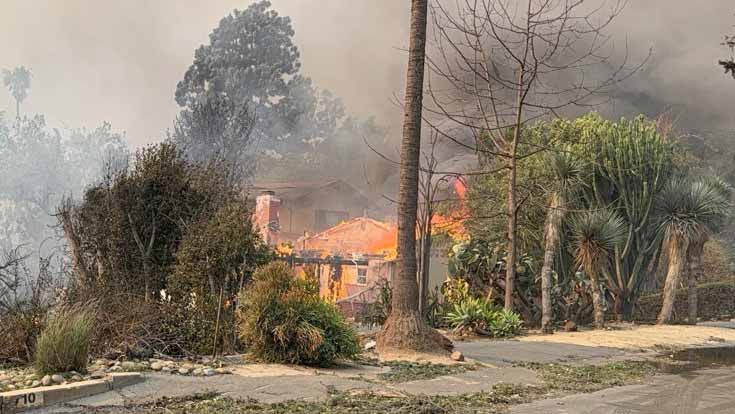
A home burns in the Los Angeles fire, which destroyed more than 16,000 structures. (Photo by John Schroer/Global Health Exchange)
A home burns in the Los Angeles fire, which destroyed more than 16,000 structures. (Photo by John Schroer/Global Health Exchange)
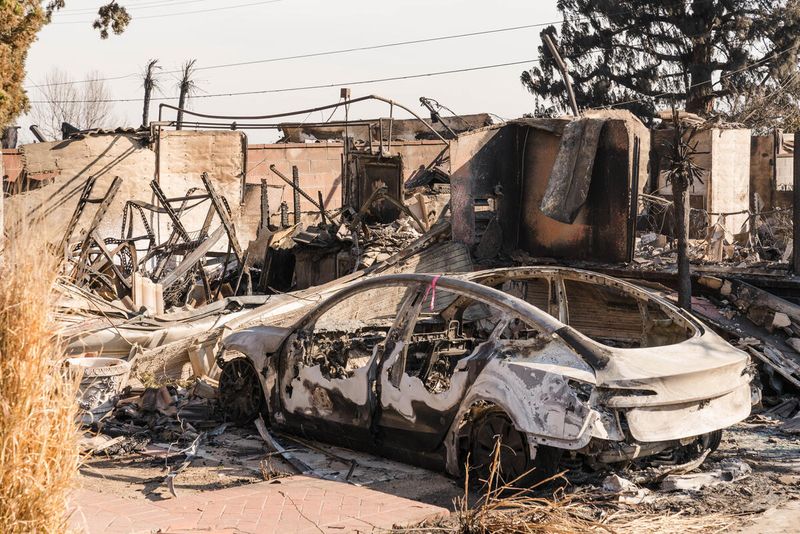
Families across the region lost homes, businesses, cars, and personal belongings. (© 2025 World Vision/photo by Amy Van Drunen)
Families across the region lost homes, businesses, cars, and personal belongings. (© 2025 World Vision/photo by Amy Van Drunen)
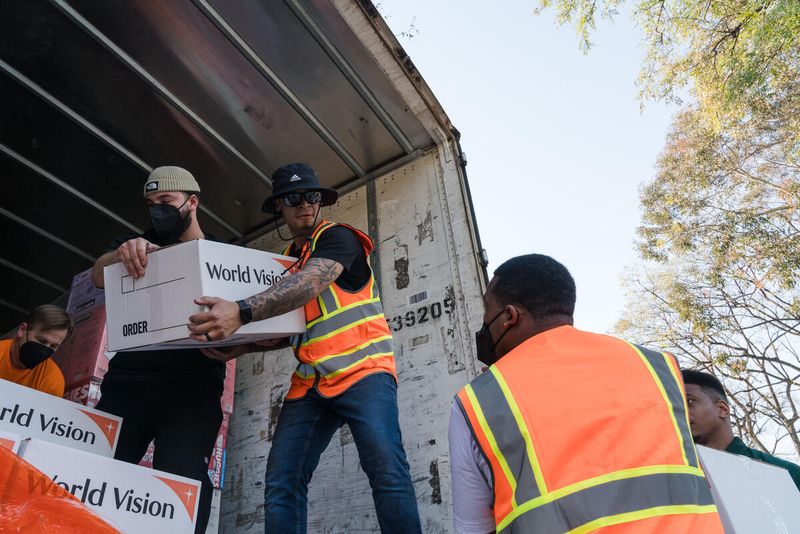
World Vision sent 26 truckloads of supplies in the first two weeks after the fires broke out for partner churches and community organizations to distribute. (© 2025 World Vision/photo by Amy Van Drunen)
World Vision sent 26 truckloads of supplies in the first two weeks after the fires broke out for partner churches and community organizations to distribute. (© 2025 World Vision/photo by Amy Van Drunen)
Pastor G.L. Kenebrew, Altadena
Shortly after the Eaton fire broke out, Pastor G.L. Kenebrew opened up his church, Hillside Tabernacle City of Faith, to serve people who had evacuated in his Altadena community.
“Although the windstorm had knocked the power out, we figured we can at least house people at the church,” he said.
But around 3:30 in the morning, the police came through the neighborhood telling everyone to evacuate immediately. He and his wife, Jerice, hopped into their car and started driving away from the flaming hills, not even stopping at their house just five minutes away from the church.
“We left our other car at the house because we didn’t think it was going to burn up,” he said. “If I had known, then we wouldn’t have left it there.”
Jerice asked him if he wanted to go get a hotel.
“I said, ‘No, we’ll sleep in the car because we’re going back [home] in a couple of hours,’” he remembered.
Around 6 a.m., though, he got a call urging him to go check on his church as word spread of other places nearby that had burned down. He and Jerice rushed back. “It looked like an apocalyptic scene,” he said. “It looked like something out of a movie. … Fire was everywhere.
“It was devastating.”
They went to check on their home, and “the house was leveled to the ground.” He and Jerice wept as they took in their losses. His wife’s grandmother’s china. A watch his godfather had given him when he became a pastor. Special books he’d received as gifts, some with personal messages written inside. Perhaps the most gut-wrenching: their wedding photos taken 20 years ago. But despite all the loss, he could still see God’s goodness.
“He spared our lives,” he said.
So many of his family and friends also lost their homes and all their earthly possessions. The businesses surrounding his church all burned. Much of his church burned — but the sanctuary and bathrooms were still intact. So just a few days after the fire, he drove to Calvary Baptist Church in San Fernando, which had partnered with World Vision to distribute supplies.
“You don’t know what you need until you need it,” he said. He joked about how odd it was to not even have the morning ritual of opening a sock or underwear drawer anymore because he simply doesn’t have one. He’d been rewashing the clothes he was wearing each day since the fire.
“My brother has a saying — you never miss what you have until it becomes what you had,” he said.
Pastor Kenebrew had borrowed a truck for the trip, filling it with supplies from World Vision to hand out to his congregants and community members, along with a generator.
He had resolved that his congregation were going to meet and praise God amid the ashes.
“Even though I’m hurting, we’re hurting together,” he said. “We’re going to mend together. That’s what I believe World Vision is about. I appreciate you all.”
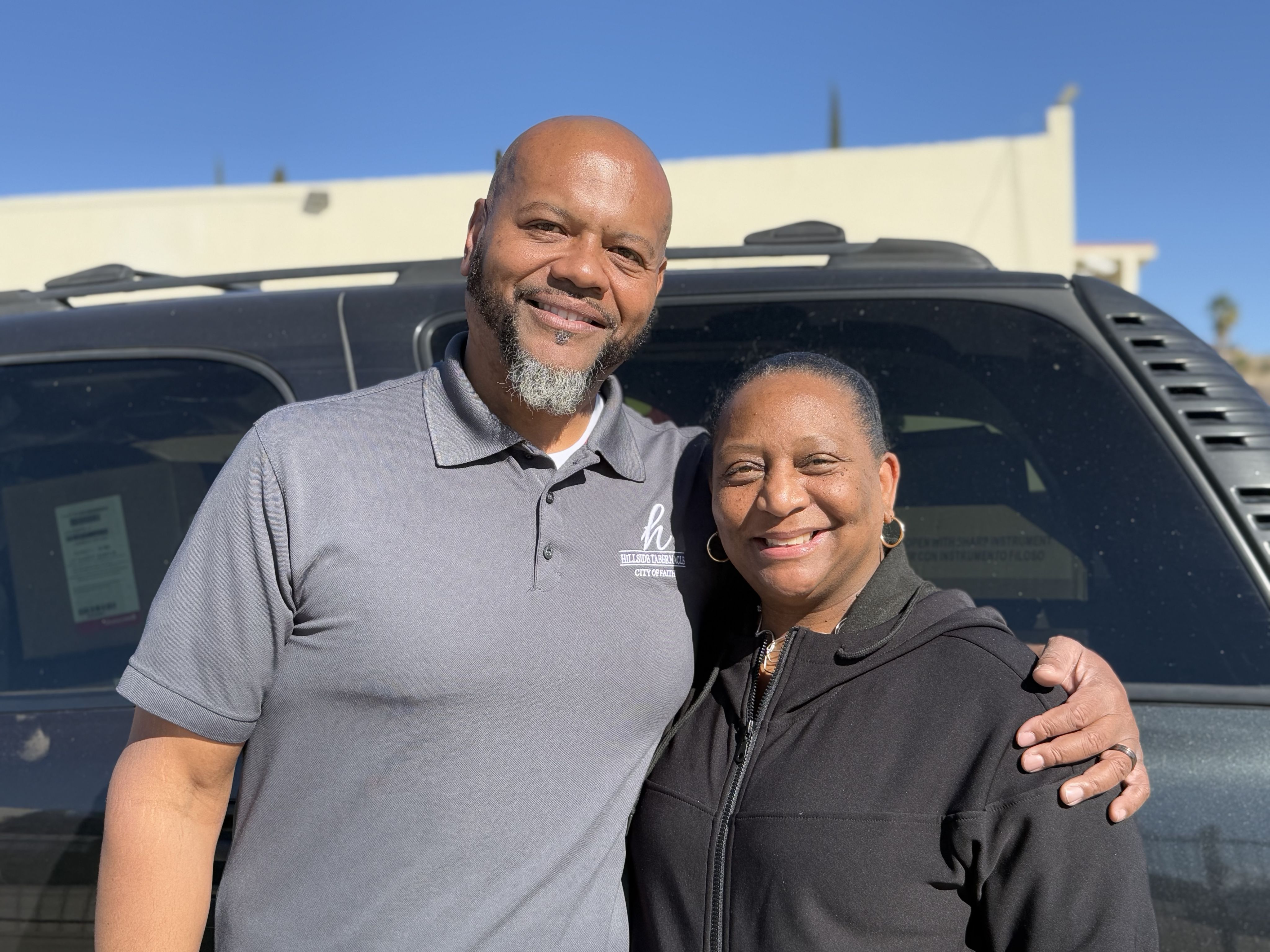
G.L. and Jerice Kenebrew (© 2025 World Vision/photo by Kristy J. O’Hara-Glaspie)
G.L. and Jerice Kenebrew (© 2025 World Vision/photo by Kristy J. O’Hara-Glaspie)
“Even though I’m hurting, we’re hurting together. We’re going to mend together. That’s what I believe World Vision is about.”
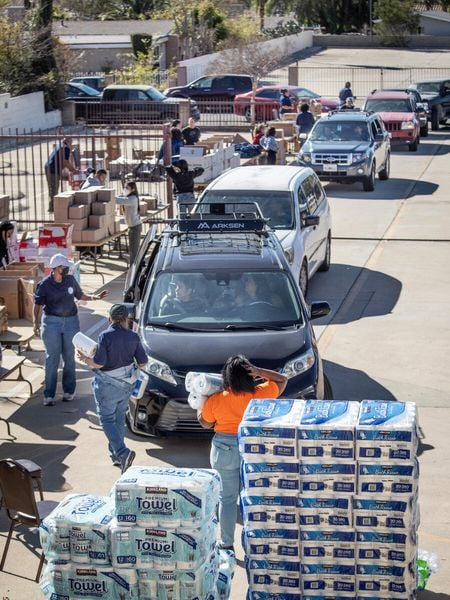
Calvary Baptist Church in San Fernando hosted a drive-through supplies distribution. (© 2025 Genesis Photo Agency/photo by Greg Schneider)
Calvary Baptist Church in San Fernando hosted a drive-through supplies distribution. (© 2025 Genesis Photo Agency/photo by Greg Schneider)
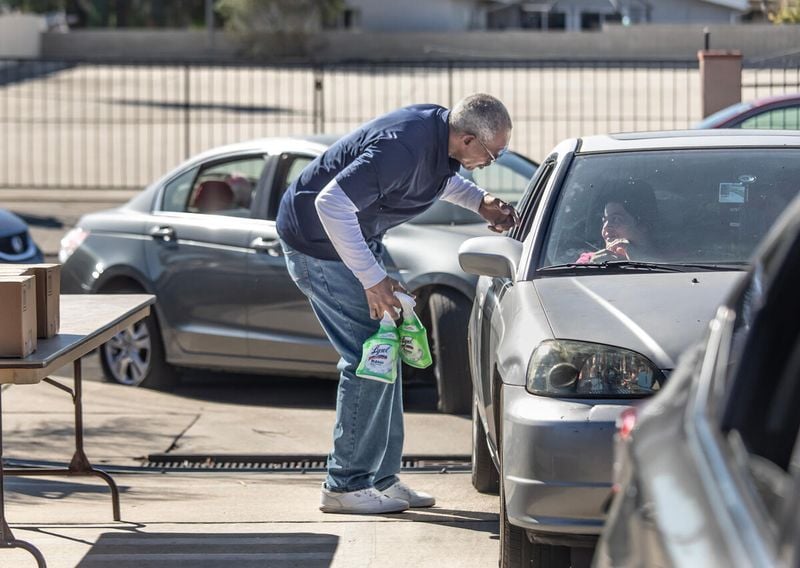
A volunteer from Calvary Baptist Church greets someone at the distribution the church hosted. (© 2025 Genesis Photo Agency/photo by Greg Schneider)
A volunteer from Calvary Baptist Church greets someone at the distribution the church hosted. (© 2025 Genesis Photo Agency/photo by Greg Schneider)
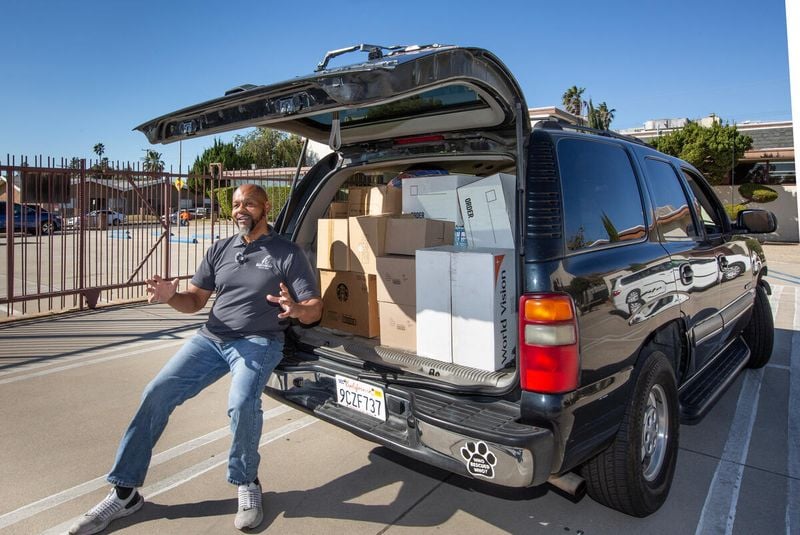
Pastor Kenebrew talks to people after he’s picked up supplies to share with his congregants and other community members. (© 2025 Genesis Photo Agency/photo by Greg Schneider)
Pastor Kenebrew talks to people after he’s picked up supplies to share with his congregants and other community members. (© 2025 Genesis Photo Agency/photo by Greg Schneider)
Totress Beasley, Pasadena
For Totress Beasley, the Eaton fire changed the mood of January 7, which was supposed to be a day of pure joy and celebration. After years of hard work, she finally paid off her home, situated right on the border of Altadena and Pasadena.
“I paid off my house on January the seventh — the last payment hit the system,” she said, “and my house burned down on January 8.”
The fire moved so fast that all Totress grabbed was one of her most prized possessions — her praise flags she uses for worshipping.
“I didn’t get a chance to take anything [else] out, so I lost everything,” she said.
Totress has been attending Victory Bible Church in Pasadena for 16 years, so when tragedy struck, her church family stepped in to help her and others affected by the fire.
The church put her up in a hotel, and she received a suitcase of supplies that she kept in the car that night. When she went out early in the morning to go through it, everything hit her.
“I’m in my car, turned on the heat, and I began to cry,” she said. “… I’m going through a suitcase to find something to wear! You know? It’s different.
“I’m not going in my closet. … This is it. … And I’m just glad to be here. I’m still alive.”
The Sunday after, she went to church to worship, like she does every week. But this Sunday she also got to pick up more essentials at the church’s supplies distribution. World Vision had delivered a shipment from Chicago. Totress needed food, underwear, shoes, and other necessities, as she had to go back to work the next day.
“It’s a blessing that the church is giving stuff and different people are giving stuff around the community, and we’re just going to get what we need,” she said.
When Totress was 19 or 20, she actually worked for World Vision’s office in Monrovia, and she also had previously sponsored a child with World Vision. It felt strange, she said, to go from being a helper to receiving the help.
“I love World Vision. … You guys do wonderful work helping people all around the world, and I thank you for being here today.”
Totress is hopeful that she’ll be able to rebuild her house. She said, “I can’t sell my property — it’s the only thing I have.”
When asked how she was able to show up at church to worship and appear so calm in the midst of her storm, her response was simple.
“It’s God,” Totress said. “You know, you’ve been in church all your life, and you worship God in the good times, but you’re tested in the bad times. And if you’ve secured yourself in the good times, you can stand strong in the bad times.”
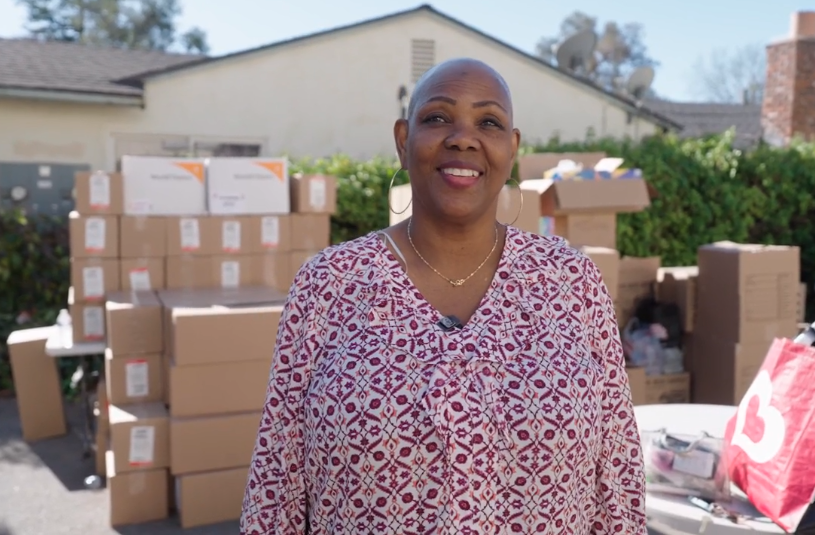
Totress Beasley (© 2025 World Vision/photo by Ben Chandler)
Totress Beasley (© 2025 World Vision/photo by Ben Chandler)
“You worship God in the good times, but you’re tested in the bad times. And if you’ve secured yourself in the good times, you can stand strong in the bad times.”
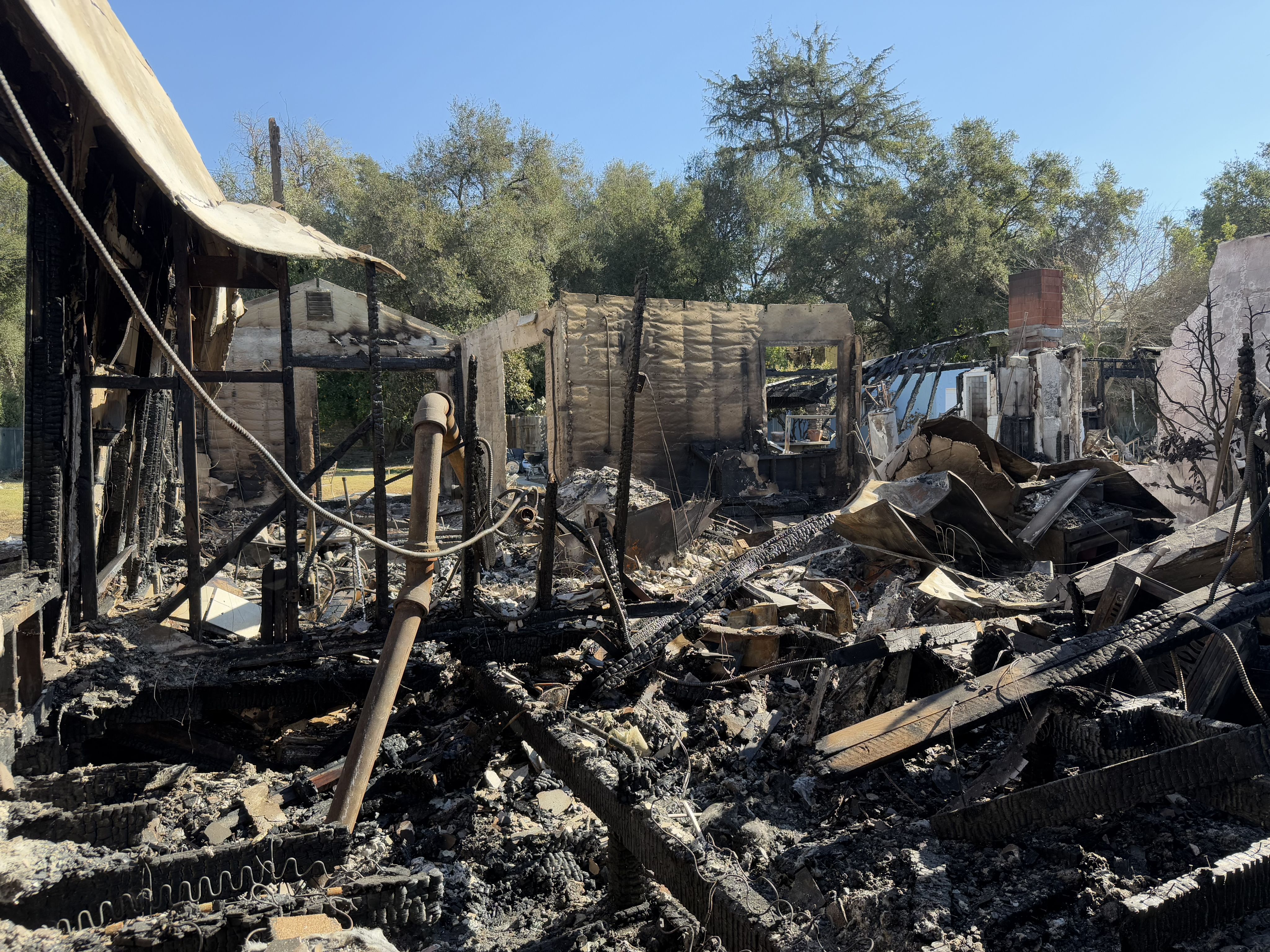
Totress paid off her house on January 7, and it burned down in the Eaton fire on January 8. (© 2025 World Vision/photo by Kristy J. O'Hara-Glaspie)
Totress paid off her house on January 7, and it burned down in the Eaton fire on January 8. (© 2025 World Vision/photo by Kristy J. O'Hara-Glaspie)
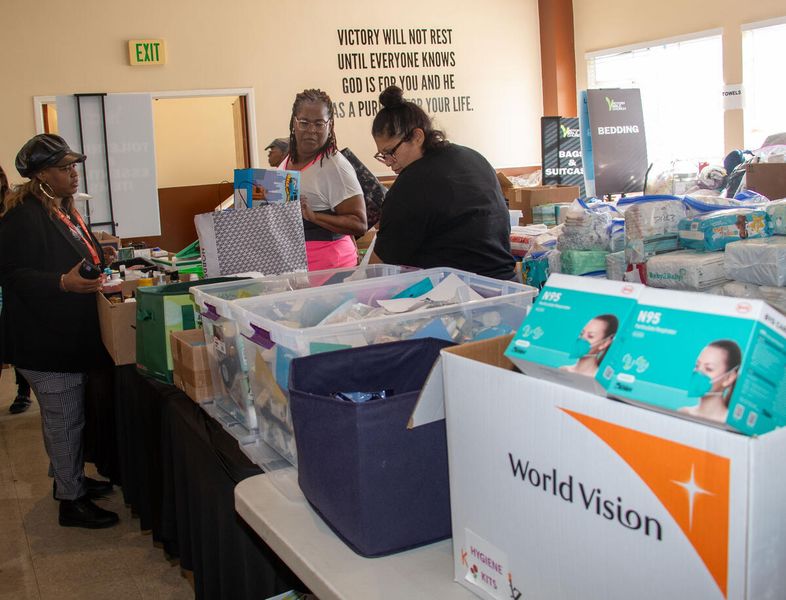
Community members walk through one of the areas filled with relief supplies at Pasadena’s Victory Bible Church, which hosted a distribution to help community members. World Vision donated some supplies to the event. For the past 16 years, Totress has attended the church, and she was able to get some supplies for herself at the distribution. (© 2025 Genesis Photo Agency/photo by Andrew Silk)
Community members walk through one of the areas filled with relief supplies at Pasadena’s Victory Bible Church, which hosted a distribution to help community members. World Vision donated some supplies to the event. For the past 16 years, Totress has attended the church, and she was able to get some supplies for herself at the distribution. (© 2025 Genesis Photo Agency/photo by Andrew Silk)
Tonita Fernandez, Altadena
When Tonita Fernandez was told she needed to evacuate immediately, she turned her eyes to the hillside above her.
“I looked up at the fires, and I said, ‘There is no way those fires are going to make it down that mountain!’” she recalled. “We have a fire department right there on Lincoln Avenue — they’ll be there to save our homes.”
Tonita has beaten the odds before. Six years ago, she was given six months to live. The cancer diagnosis came as a shock, but her main concern was for her daughter’s family who was living with her.
“I wanted them to all have a space, to have their own bedroom, to have a safe haven if I was to transition on,” she said.
She recovered and began the process of remodeling her home and building an addition. Another family took them in for nearly three years as they dealt with the arduous process. She even got ripped off by a contractor who took her money and ran. When they were nearing completion in the fall of 2024, she again had a health scare: open-heart surgery, which required machines to aid her recovery. But after all the health crises, she and her family finally all moved back into their home right before Christmas. She was thrilled to be back and loved that she even had the blue cabinets she’d always wanted.
Her home had become her sanctuary. So when the Eaton fire broke out, she couldn’t bear to believe it.
But the family evacuated, packing up all the kids in the car and driving back to the same family who had housed them before, grateful for a place to go. They didn’t take much, as Tonita planned to return the next morning for a few things to hold them over until they could return home permanently.
“What I got instead was calls from neighbors and friends and family saying, ‘Oh, your house burned down,’” she said. “I was somewhat in shock because we just didn’t think [that would happen]. We didn’t take anything — birth certificates, clothes. … The kids did take their iPads — they were thinking.”
It felt surreal. After years of remodeling, it was all gone. All the kids’ new Christmas presents were gone. Her blue cabinets were gone.
“But, you know? I thank God for our lives and that everybody’s safe,” Tonita said. “And I pray for those families who weren’t as fortunate to get out and had loved ones who died and pray for all those that lost their homes. We’re kind of all in this together, but the glory that comes from it is the fact that a community has come together.”
She was grateful that the same family that had housed them for so long had taken them in again. She also said her children’s school had provided some support, and friends had set up a GoFundMe page for her family.
Churches had stepped in to help her as well. Tonita attends Community Bible Church in Pasadena but heard that Victory Bible Church was distributing supplies, so she went hoping to secure a generator. With high winds still looming and fires still raging, power was proactively being turned off at times to prevent further flares and more destruction, but she needed power for her rehabilitation machines.
While Victory didn’t have a generator, two World Vision staff were able to find one being delivered to another distribution later that day and arranged for her to pick it up there later.
“We were blessed, so I’m thankful for that because we don’t know what’s going to happen with the power, and I’m more nervous, especially with my health issues, if the [power] goes out, what am I going to do?” she said. “ … As I’m rehabbing, if it goes out, I don’t have to worry about that part.”
Incredibly, she said the devastating experience has actually helped encourage her in the midst of everything going on in the world.
“I remember watching the elections, and the politicians arguing and talking about each other, just badmouthing one another, and I said, ‘Wow, what kind of world are we living in?’” Tonita said. “I was actually giving up hope. But at least this journey has brought hope.”
Story published on March 5, 2025
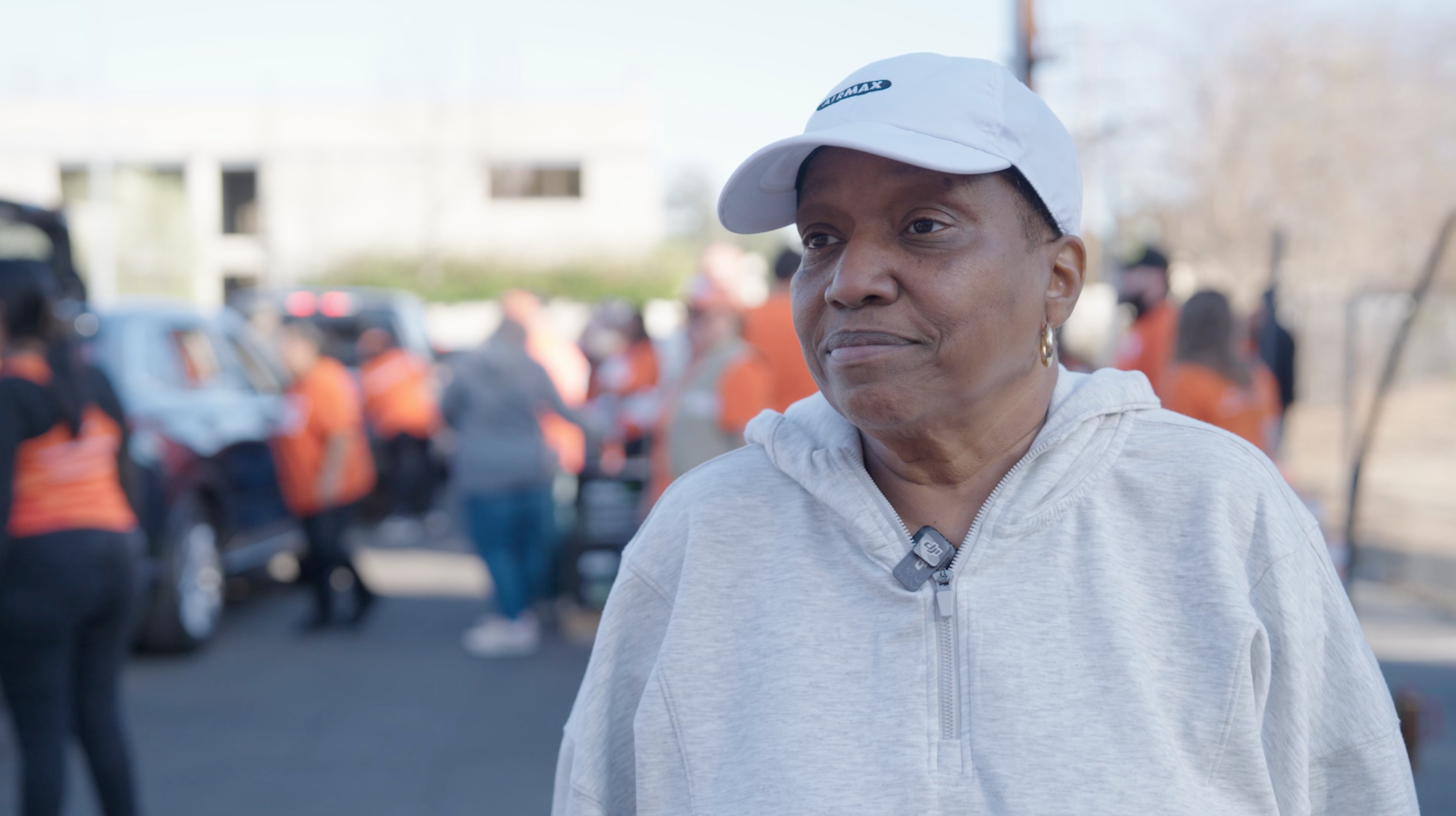
Tonita Fernandez (© 2025 World Vision/photo by Ben Chandler)
Tonita Fernandez (© 2025 World Vision/photo by Ben Chandler)
“I thank God for our lives and that everybody’s safe.”
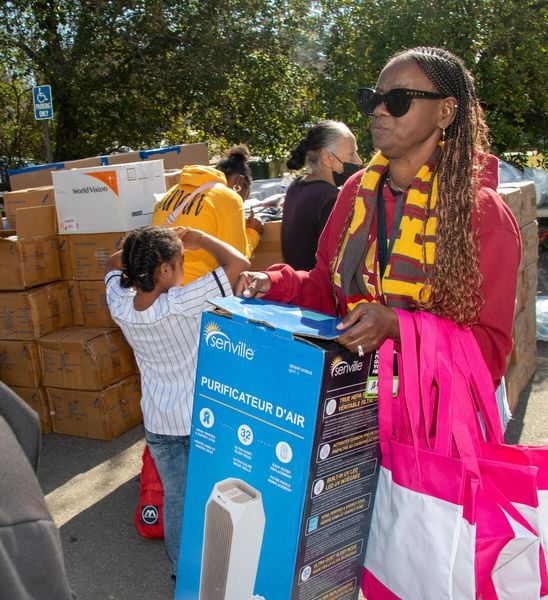
Alicia Hazelton of Victory Bible Church hands out air purifiers and tote bags for people to use for carrying clothes and hygiene products. Tonita had received some supplies here and hoped to secure a generator at the distribution, but wasn’t able to. (© 2025 Genesis Photo Agency/photo by Andrew Silk)
Alicia Hazelton of Victory Bible Church hands out air purifiers and tote bags for people to use for carrying clothes and hygiene products. Tonita had received some supplies here and hoped to secure a generator at the distribution, but wasn’t able to. (© 2025 Genesis Photo Agency/photo by Andrew Silk)
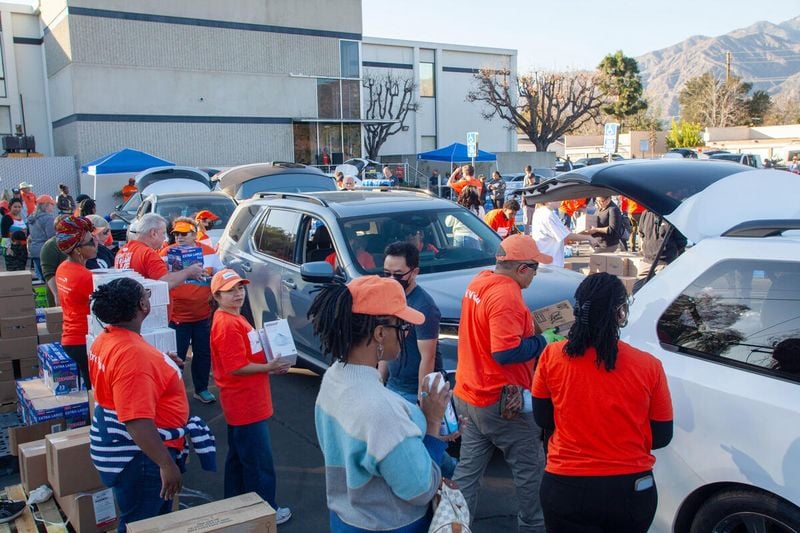
World Vision staff and volunteers hand out supplies at the organization’s global center office in Monrovia. Staff had tracked down a generator and held it at this distribution site for Tonita. (© 2025 Genesis Photo Agency/photo by Andrew Silk)
World Vision staff and volunteers hand out supplies at the organization’s global center office in Monrovia. Staff had tracked down a generator and held it at this distribution site for Tonita. (© 2025 Genesis Photo Agency/photo by Andrew Silk)
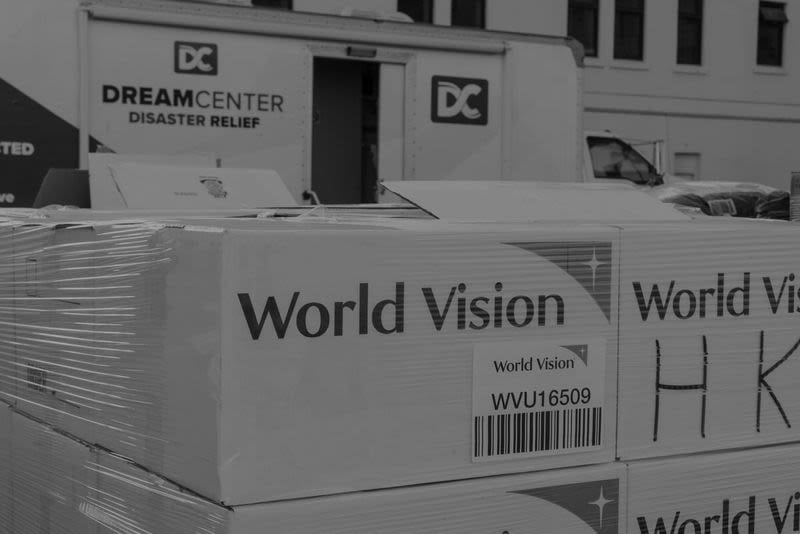
Long-term recovery stories
-
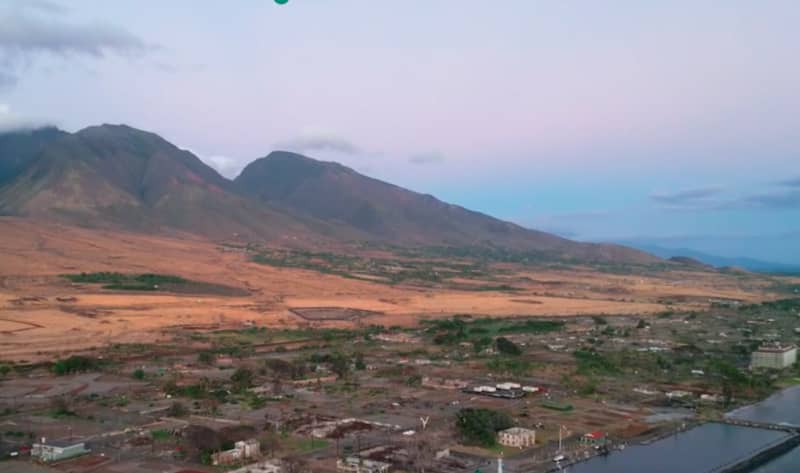
Working alongside partners to support Maui relief efforts
World Vision is continuing to support recovery efforts in the wake of the 2023 fires by aiding the work of local churches and community organizations through donations such as boxes of fresh food, household goods, hygiene supplies, and school backpacks. -
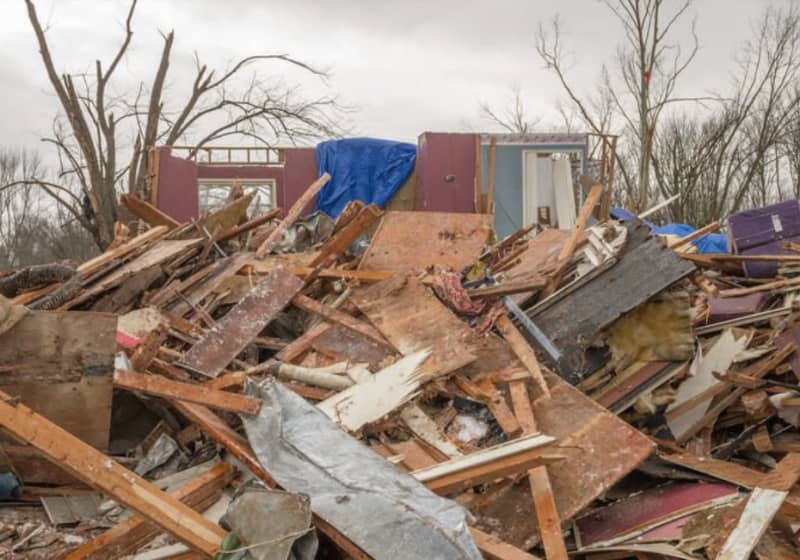
Tornado destruction and long-term recovery in Kentucky
Two brothers who work in construction have been helping their community rebuild after a tornado plowed through their neighborhood in Bowling Green, Kentucky, on December 10, 2021. Read how World Vision partnered with a local church to come alongside them for long-term recovery. -
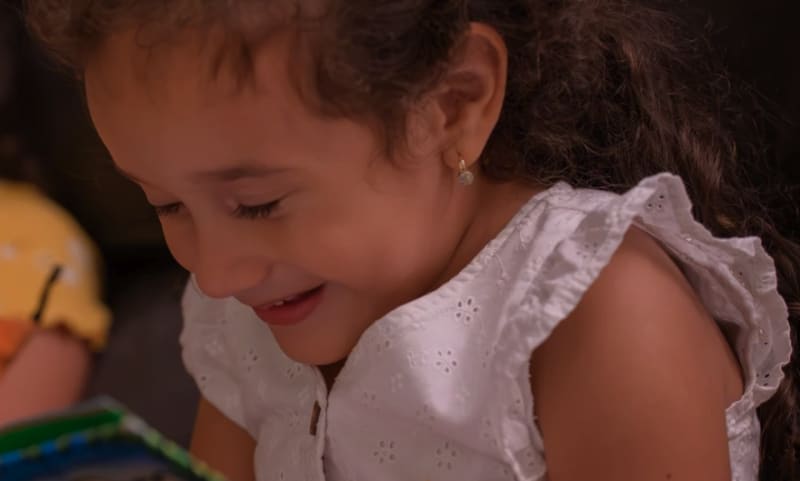
From disasters to healing: World Vision's work in the U.S.
World Vision responds to disasters globally, including in the United States. Learn about World Vision’s history of U.S. disaster responses, as well our work in education and distributing essential supplies and building materials to communities affected by emergencies in the U.S.

